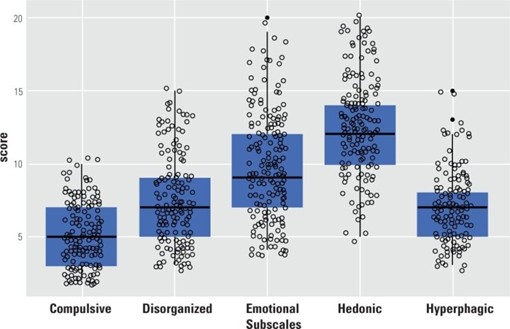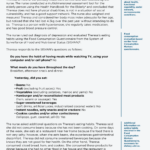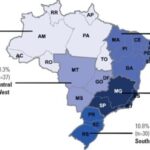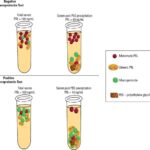Daniela Barros, post graduate student, Surgical Clinic Program, Ribeirão Preto Medical School, University of São Paulo (FMRP-USP), Ribeirão Preto, SP, Brazil.
The identification of distinct eating behavior phenotypes has become increasingly relevant in obesity research and clinical practice, given their role as mediators between genetic predisposition, emotional regulation, and weight gain across the life cycle.
To capture these multidimensional patterns, the Escala de Fenótipos de Comportamento Alimentar (EFCA) was originally developed and validated in Argentinian Spanish as a psychometric tool capable of characterizing maladaptive eating tendencies such as compulsive overeating, hedonic drive, emotional coping through food, hyperphagia, and disorganized eating habits. These phenotypes not only influence caloric intake self-regulation but also serve as potential targets for precision medicine approaches in obesity treatment.
In this context, Brazilian researchers from the Santa Casa de Misericórdia de São Paulo, in collaboration with the Universidade Federal de Minas Gerais and the Universidade Federal do Rio de Janeiro, conducted the first Brazilian Portuguese validation of the EFCA published in Validation for Brazilian Portuguese of the Eating Behavior Phenotypes Scale (EFCA): confirmatory factor analysis and psychometric properties (Archives of Endocrinology and Metabolism, vol. 69, no. 4, 2025).

Image: PINEDA-WIESELBERG, R.J., et al.
The study confirmed robust psychometric properties for the instrument, mirroring the original design. At the same time, the findings highlighted cultural influences, particularly regarding the normative expectation to finish meals in Brazil, which impacted the performance of specific items. Interestingly, no significant correlation was observed between EFCA scores and body mass index (BMI), underscoring the limitations of anthropometric markers as external validation criteria for behavioral constructs.
The EFCA was originally developed and validated in Argentinian Spanish to assess multidimensional eating behavior phenotypes such as compulsive, hedonic, emotional, hyperphagic, and disorganized patterns. To adapt the tool for Brazilian Portuguese, researchers conducted independent forward and back translations, achieving full agreement between versions.
A total of 206 Brazilian adults, aged 18 to 73, were recruited anonymously through social media in 2024. Participants completed a self-administered survey including demographic data, self-reported anthropometry, and the Brazilian version of the EFCA. Psychometric testing included Cronbach’s alpha for internal consistency, exploratory and confirmatory factor analyses, and Pearson’s correlations with body mass index (BMI) as an external validity criterion.
The Brazilian EFCA exhibited good internal consistency (Cronbach’s alpha = 0.83), exceeding the accepted threshold of 0.70. Subscales showed acceptable reliability, ranging from 0.71 (hedonic) to 0.83 (emotional). Factorial analyses confirmed a stable five-factor structure, but in one item (Question 14: “When I eat something I like, I finish the entire portion”), it showed weak factor loading (0.29), suggesting cultural bias, as in Brazil, the act of finishing one’s plate is socially reinforced rather than solely reflective of hedonic eating. In Brazilian culture, finishing meals is often considered normative or socially expected, which may compromise the item’s sensitivity, highlighting the need to consider local eating practices when adapting psychometric tools across populations.
Despite the strong internal validity, no significant correlation was observed between EFCA scores and BMI. This contrasts with the original Argentinian validation, which found moderate associations between some subscales and BMI (ANGER, V.A., et al., 2022). The authors attribute the discrepancy partly to self-reported anthropometric data, which may have introduced bias, and to the limitations of BMI as an external criterion that fails to capture behavioral nuances.
These findings echo prior calls for more nuanced external markers, such as binge-eating frequency, laboratory-based food intake tests, or the presence of clinically diagnosed eating disorders (GOLDSCHMIDT, A.B., et al., 2018; BOUHLAL, S. et al., 2017).
The validation of the Eating Behavior Phenotypes Scale for Brazilian Portuguese not only reinforces its internal consistency but also raises important reflections on cultural adaptation, methodological limitations, and future directions in behavioral nutrition research.
Clinically, the EFCA has potential as a screening instrument for characterizing patients’ behavioral profiles prior to or alongside obesity treatment. Phenotyping individuals according to compulsive, hedonic, emotional, disorganized, and hyperphagic tendencies may enable a more tailored approach, particularly as precision medicine strategies gain traction in obesity care (SIMPSON, S.J., et al., 2017). Such stratification could inform both non-pharmacological interventions, such as cognitive-behavioral therapy or nutritional counseling, as well as pharmacological approaches. By identifying maladaptive eating patterns before obesity is fully established, clinicians may also intervene earlier with preventive strategies.
From a methodological standpoint, this study benefitted from a relatively large sample, consistent with established recommendations for factor analysis (COMREY, A.L., et al., 1992). Nevertheless, the short data collection window (September 23–25, 2024) and the recruitment method (via social media platforms) may have resulted in a sample that is younger, more digitally literate, and potentially more health-conscious than the general population. Further validations in clinical samples, as well as in populations with lower digital access, are necessary to confirm the scale’s robustness and generalizability.
In summary, this validation strengthens the EFCA’s standing as a psychometrically sound instrument for Portuguese-speaking populations and underscores the importance of culturally sensitive adaptation and the search for more appropriate external validation markers. Future research should prioritize longitudinal studies, explore sex- and age-related differences in eating phenotypes, and investigate the EFCA’s predictive value for treatment outcomes in both behavioral and pharmacological interventions.
To read the article, access
PINEDA-WIESELBERG, R.J., et al. Validation for Brazilian Portuguese of the Eating Behavior Phenotypes Scale (EFCA): confirmatory factor analysis and psychometric properties. Archives of Endocrinology and Metabolism [online]. 2025, vol. 69, no. 3, e240404. [viewed 30 September 2025]. https://doi.org/10.20945/2359-4292-2024-0404. Available from: https://www.scielo.br/j/aem/a/CR4WMYHh678QCvM5fpcfqxK/
References
ANGER, V.A., et al. Escala de Fenotipos de Comportamiento Alimentario (EFCA), análisis factorial confirmatorio y propriedades psicométricas Nutr. Hosp. [online]. 2022, vol. 39, no. 2, pp. 405-410 [viewed 30 September 2025]. https://doi.org/10.20960/nh.03849. Available from: https://scielo.isciii.es/scielo.php?script=sci_arttext&pid=S0212-16112022000200021
BOUHLAL, S. et al. Identifying eating behavior phenotypes and their correlates: A novel direction toward improving weight management interventions. Appetite [online]. 2017, vol.111, pp. 142-150 [viewed 30 September 2025]. https://doi.org/10.1016/j.appet.2016.12.006. Available from: https://pubmed.ncbi.nlm.nih.gov/28043857/
BRASIL. Presidência da República. Casa Civil. Subchefia para Assuntos Jurídicos. Código de Defesa do Consumidor. Decreto Presidencial. nº 2.181, de 20 de março de 1997 [online]. Diário Oficial da União. 1997 [viewed 30 September 2025]. Available from: https://www.planalto.gov.br/ccivil_03/decreto/d2181.htm
COMREY, A.L., et al. A first course in factor analysis (2nd ed). Mahwah: Lawrence Erlbaum Associates, Inc., 1992.
GOLDSCHMIDT, A.B., et al. A Pilot Study of Neural Correlates of Loss of Control Eating in Children With Overweight/Obesity: Probing Intermittent Access to Food as a Means of Eliciting Disinhibited Eating. J Pediatr Psychol. [online]. 2018, vol. 43, no. 8, pp. 846-855. [viewed 30 September 2025]. https://doi.org/10.1093/jpepsy/jsy009. Available from: https://pubmed.ncbi.nlm.nih.gov/29462339/
SIMPSON, S.J., et al. The Geometric Framework for Nutrition as a tool in precision medicine. Nutr Healthy Aging [online]. 2017, vol. 4, no. 3, pp. 217-226 [viewed 30 September 2025] https://doi.org/10.3233/nha-170027. Available from: https://pmc.ncbi.nlm.nih.gov/articles/PMC5734128/
External links
Archives of Endocrinology and Metabolism – AEM
Como citar este post [ISO 690/2010]:



















Recent Comments